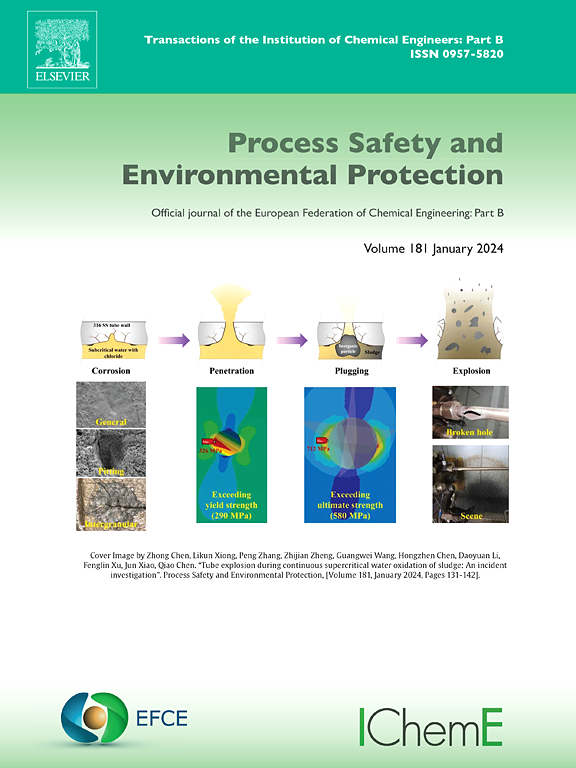Investigation into the thermal stability and decomposition processes in AlH3 and stearic acid-coated AlH3
IF 6.9
2区 环境科学与生态学
Q1 ENGINEERING, CHEMICAL
引用次数: 0
Abstract
Aluminium hydride (AlH3), a promising metal-based hydrogen storage material, faces problems related to its relatively poor stability. In the paper, the thermal stability of stearic acid-coated AlH3 (SA/AlH3) and AlH3 was compared by thermogravimetric analysis and minimum ignition temperature test, including pyrolysis and ignition stability. The decomposition temperature and apparent activation energy of SA/AlH3 were higher than those of AlH3, indicating that the decomposition was more difficult. During pyrolysis, SA/AlH3 demonstrated a higher minimum ignition temperature and a slower rate of potential energy decline, which indicated that the coating of SA had improved the thermal stability of AlH3. Reactive force field molecular dynamics simulation revealed the difference in pyrolysis behavior between AlH3 and SA/AlH3. Small molecular products such as H2, H2O, CH4, C2H4, CO, and CO2 were generated, further generating clusters dominated by C-Al bonds. Improving the thermal stability of SA/AlH3 coating is an important reference for the application of AlH3 in energetic materials.
硬脂酸包覆AlH3的热稳定性及分解过程研究
氢化铝(AlH3)是一种很有前途的金属基储氢材料,其稳定性相对较差,面临着一些问题。本文通过热重分析和最低着火温度测试,比较硬脂酸包覆AlH3 (SA/AlH3)和AlH3的热稳定性,包括热解稳定性和着火稳定性。SA/AlH3的分解温度和表观活化能均高于AlH3,说明SA/AlH3的分解难度较大。在热解过程中,SA/AlH3表现出较高的最低着火温度和较慢的势能下降速率,说明SA的包覆提高了AlH3的热稳定性。反应力场分子动力学模拟揭示了AlH3与SA/AlH3热解行为的差异。生成H2、H2O、CH4、C2H4、CO、CO2等小分子产物,进一步生成以C-Al键为主的簇。提高SA/AlH3涂层的热稳定性对AlH3在含能材料中的应用具有重要的参考意义。
本文章由计算机程序翻译,如有差异,请以英文原文为准。
求助全文
约1分钟内获得全文
求助全文
来源期刊

Process Safety and Environmental Protection
环境科学-工程:化工
CiteScore
11.40
自引率
15.40%
发文量
929
审稿时长
8.0 months
期刊介绍:
The Process Safety and Environmental Protection (PSEP) journal is a leading international publication that focuses on the publication of high-quality, original research papers in the field of engineering, specifically those related to the safety of industrial processes and environmental protection. The journal encourages submissions that present new developments in safety and environmental aspects, particularly those that show how research findings can be applied in process engineering design and practice.
PSEP is particularly interested in research that brings fresh perspectives to established engineering principles, identifies unsolved problems, or suggests directions for future research. The journal also values contributions that push the boundaries of traditional engineering and welcomes multidisciplinary papers.
PSEP's articles are abstracted and indexed by a range of databases and services, which helps to ensure that the journal's research is accessible and recognized in the academic and professional communities. These databases include ANTE, Chemical Abstracts, Chemical Hazards in Industry, Current Contents, Elsevier Engineering Information database, Pascal Francis, Web of Science, Scopus, Engineering Information Database EnCompass LIT (Elsevier), and INSPEC. This wide coverage facilitates the dissemination of the journal's content to a global audience interested in process safety and environmental engineering.
 求助内容:
求助内容: 应助结果提醒方式:
应助结果提醒方式:


